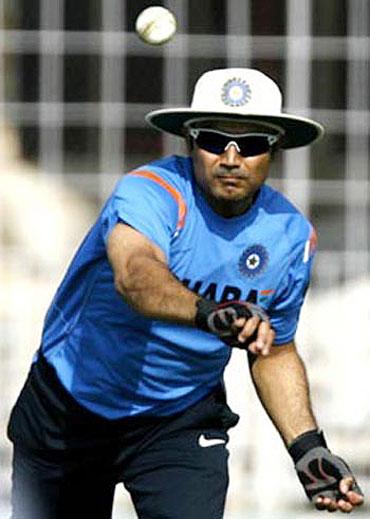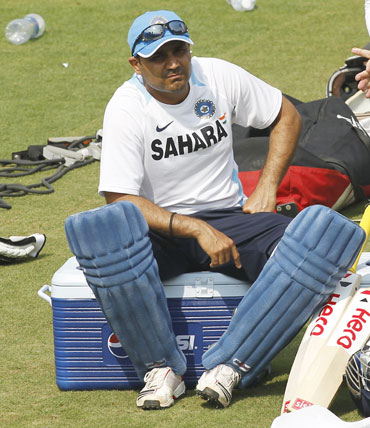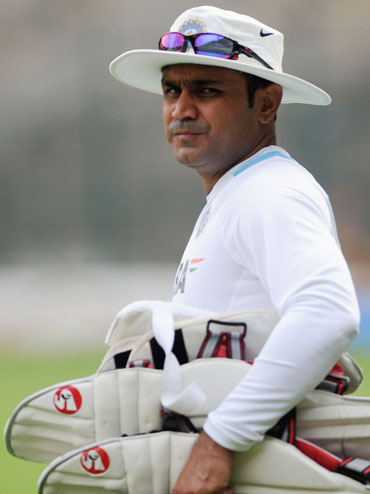Two-and-a-half years after making his ODI debut, Virender Sehwag played his first Test. Eleven years and 99 Tests later, the 32-year-old has done incredibly well for himself, says Bikash Mohapatra.
Virender Sehwag isn't your regular Test player.
The virtues one associates with a classical batsman of the five-day game -- patience, perseverance, fortitude, pragmatism et al -- aren't something that can be attributed with this Delhi batsman.
On the contrary, Sehwag personifies aggression, belligerence, flamboyance and persistence, qualities that typify a class player in the shorter versions.
(For the record, Sehwag's trademark 219 against the West Indies in Indore last year is the highest ODI score)
No wonder it took him two-and-a-half years, following his ODI debut, to play his first Test -- against South Africa in November 2001.
Sehwag has done incredibly well for himself
To his credit, though, he made most of the opportunity, scoring 105 on a hostile wicket at the OUTsurance Oval (then ChevroletPark), as he and Sachin Tendulkar (155) put on 220 runs for the fifth wicket.
In the 11 years that followed, the 32-year-old has done incredibly well for himself. He made it to the top 20 batsmen of all-time, with an aggregate of 8,448 runs.
And 14 of his 23 centuries are 150-plus knocks, a clear indication that the batsman has more often than not made his three-figure knocks count.
Besides, he is one of the only four batsmen – Sir Don Bradman, Brian Lara and Chris Gayle being the others – to have two triple hundreds to his name.
A player who can win a match on his own
The first of those knocks, a belligerent 309 against Pakistan at Multan in March 2004, continues to remain his best.
Playing only in his 21st Test, Sehwag bludgeoned the Pakistani bowlers, putting on 336 runs for the third wicket with Tendulkar (194 not out), to ensure India a memorable win.
The knock reaffirmed his growing reputation as a player who could win a match on his own, a reputation that has bolstered over the years.
Another innings that deserves special mention is the 201 he scored against Sri Lanka at Galle in July 2008. Caught in the web of Ajantha Mendis's spin, India had dropped the opening Test and were clueless against the bowler in the second match as well (Mendis picking 10 wickets in the match).
Sehwag was the lone batsman to counter the threat, also scoring a half century in the second innings. With his trademark aggression he not only nullified the 'Mendis threat' but also took India to a memorable win.
Sehwag's stock as a Test player has risen
It is these efforts, where he single-handedly ensured the team a result, that raised Sehwag's stock as a Test player over the years.
Not everything was hunky dory though. His technique and temperament have always been questioned. Critics have pointed out that he cannot be depended upon, considering his aggressive approach to his game.
The batsman's reluctance to change his batting approach as per demands have also come in for a great deal of criticism, as also the fact that at times he tends to throw his wicket away, when the team could ill-afford that.
To make matters worse, there have been considerably long barren stretches, like the fact that he didn't score a Test century in almost two years till the 117 in the opening Test against England in Motera last week.
The fact that the 34-year-old is outspoken – as opposed to his more diplomatic colleagues - and doesn't take to criticism kindly has also worked against him on many occasions.
Sehwag's aggression has done him more good
Having said that, his aggression has done him much good, as witnessed when he has got going and taken the match away from the opposition.
Also, to his credit, he has never let criticism affect his style of batting. Success or failure notwithstanding, Sehwag's flamboyance has been the same throughout his career, the hallmark of his batting, more apparent in the game's longer format.
And it is this single-handed dominance that has got him reverence from the fans and skeptics alike.
One cannot also negate the fact that despite not valuing his wicket as much and not adjusting his batting as per requirement, he still averages in excess of 50.
For someone playing in his 100th Test, against England at the Wankhede stadium starting today, this is no mean feat.
Add to it the fact that he isn't the quintessential Test batsman, his success becomes all the more significant.






Comment
article